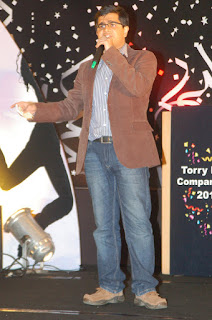Again a reflection on how we work, and perform in this changing knowledge economy. I don't work for you, I work for the Customer. This was the thought that came to my mind when I read Ram Charan's What the Customer Wants You To Know over the weekend this time.
The thought applies to anyone who is either in a services domain building solutions for customers, or in the products field, making stuff that world uses day in and out. It happened one day - I spoke to an ordinary looking guy. He told me he was excited with what happened at work today. He was sent a Thank you card by his Boss. I asked him more. He worked his head off the last weekend, as they had some strict deliverable. So as a ornament of gesture, his boss (not the company owner) delighted him with this. Of course he was happy, elated and a joy that deserved a drink or two.
I asked him a question which amused him. "Whom do you work for ? "
"I work for my company, and my boss." Pat came the reply. What's so different about it. I probe him further. "What about the customers of your company ?" And, he was fast to come back. "Yes, of course, I work for them too" - he replied.
"So does that mean, you work for your company, your boss and then the customers. Why not the reverse. " - I said.
"What do you mean ? " - he looked pissed, no denying he was in not in a mood to get probed further.
"If I do a good job at work, and the guy on my head replies - Thanks. How does that sound ? Does it sound like I helped him / her in getting some work done. What is the thing I did that deserved a Thanks for ? I worked so that our customer gets the worth of his/her penny. " - I added more spice to the talk.
Lets dissect this for a moment. I feel, the word "Thanks" from your Boss and not from the customer makes you disjunct from the company. That single word has a potential to prove that an employee is just another contributor in the vast chain of things in an organisation. This worked fine in an era when industrial revolution was the order of the day. Not now. "Thanks" to a junior employee for a work he was assigned to do, means - "You helped me to get a work done. Thanks for your help."
What really is in between the line is the fact that you are just another brick in the wall.
But Is a perfect wall just a set of nicely set bricks or more ?
Today, when organizations are talking about involving an employee in the growth story, by giving away more ownership opportunities, and a chance to own the set of things by being more entrepreneurial, how good is a "Thanks" ? I guess its an insult. Strong words, but true.
If you really want to connect the employee to the organization, don't say Thanks.
Yes, this is true. Try it.
Instead of Thanks, ascertain the fact that how his contribution added another feather in the cap. Ascertain the possibility it opened up for the company. Ascertain. Stress the point that glues his / her bondage with the company. Not a "Thanks", because the employee does not work for you, he / she works for the Customer.





